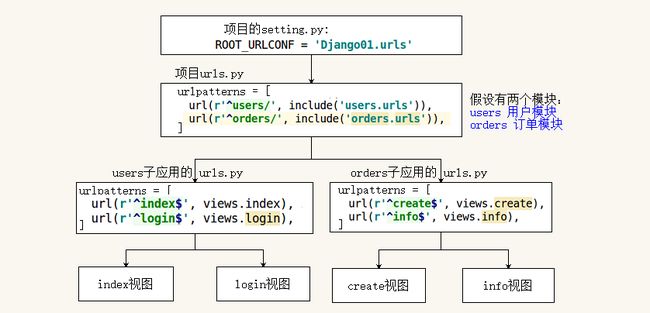一.Django URL (路由系统)
URL配置(URLconf)就像Django 所支撑网站的目录。它的本质是URL模式以及要为该URL模式调用的视图函数之间的映射表;你就是以这种方式告诉Django,对于这个URL调用这段代码,对于那个URL调用那段代码。
urlpatterns = [
url(正则表达式, views视图函数,参数,别名),
]
参数说明:
- 一个正则表达式字符串
- 一个可调用对象,通常为一个视图函数或一个指定视图函数路径的字符串
- 可选的要传递给视图函数的默认参数(字典形式)
- 一个可选的name参数 html 里面加 "{% url 'name' %}"
Here’s a sample URLconf:
from django.conf.urls import url
from django.contrib import admin from app01 import views urlpatterns = [ url(r'^articles/2003/$', views.special_case_2003), #url(r'^articles/[0-9]{4}/$', views.year_archive), url(r'^articles/([0-9]{4})/$', views.year_archive), #no_named group url(r'^articles/([0-9]{4})/([0-9]{2})/$', views.month_archive), url(r'^articles/([0-9]{4})/([0-9]{2})/([0-9]+)/$', views.article_detail), ]
Note:
#1 There’s no need to add a leading slash, because every URL has that. For
# example, it’s ^articles, not ^/articles.
#2 A request to /articles/2005/03/ would match the third entry in the list. # Django would call the function views.month_archive(request, '2005', '03'). #3 /articles/2005/3/ would not match any URL patterns #4 /articles/2003/ would match the first pattern in the list, not the second one #5 /articles/2003/03/03/ would match the final pattern. Django would call the # functionviews.article_detail(request, '2003', '03', '03').
5.2 Named groups
The above example used simple, non-named regular-expression groups (via parenthesis) to capture bits of the URL and pass them as positional arguments to a view. In more advanced usage, it’s possible to use named regular-expression groups to capture URL bits and pass them as keyword arguments to a view.
In Python regular expressions, the syntax for named regular-expression groups is (?P, where name is the name of the group and pattern is some pattern to match.
Here’s the above example URLconf, rewritten to use named groups:
import re
ret=re.search('(?P\d{3})/(?P\w{3})','weeew34ttt123/ooo') print(ret.group()) print(ret.group('id')) print(ret.group('name'))
from django.conf.urls import url
from . import views urlpatterns = [ url(r'^articles/2003/$', views.special_case_2003), url(r'^articles/(?P[0-9]{4})/$', views.year_archive), url(r'^articles/(?P[0-9]{4})/(?P[0-9]{2})/$', views.month_archive), url(r'^articles/(?P[0-9]{4})/(?P[0-9]{2})/(?P[0-9]{2})/$', views.article_detail),
url(r'^time_list/(?P\d{4}/\d{1,2}/\d{1,2}/\d{1,3})$', views.time_list), ]
# views.py
def time_list(request,post_time):
if request.method == "GET":
print(post_time.split("/"))
return HttpResponse(" ".join(post_time.split("/")))
This accomplishes exactly the same thing as the previous example, with one subtle difference: The captured values are passed to view functions as keyword arguments rather than positional arguments.
5.3 Passing extra options to view functions
URLconfs have a hook that lets you pass extra arguments to your view functions, as a Python dictionary.
The django.conf.urls.url() function can take an optional third argument which should be a dictionary of extra keyword arguments to pass to the view function.
For example:
from django.conf.urls import url
from . import views urlpatterns = [ url(r'^blog/(?P[0-9]{4})/$', views.year_archive, {'foo': 'bar'}),
]
In this example, for a request to /blog/2005/, Django will call views.year_archive(request, year='2005',foo='bar').
This technique is used in the syndication framework to pass metadata and options to views.
Dealing with conflicts
It’s possible to have a URL pattern which captures named keyword arguments, and also passes arguments with the same names in its dictionary of extra arguments. When this happens, the arguments in the dictionary will be used instead of the arguments captured in the URL.
5.4 name param
urlpatterns = [
url(r'^index',views.index,name='bieming'), url(r'^admin/', admin.site.urls), # url(r'^articles/2003/$', views.special_case_2003), url(r'^articles/([0-9]{4})/$', views.year_archive), # url(r'^articles/([0-9]{4})/([0-9]{2})/$', views.month_archive), # url(r'^articles/([0-9]{4})/([0-9]{2})/([0-9]+)/$', views.article_detail), ] ################### def index(req): if req.method=='POST': username=req.POST.get('username') password=req.POST.get('password') if username=='alex' and password=='123': return HttpResponse("登陆成功") return render(req,'index.html') ##################### "en"> "UTF-8"> Title {# #######################
5.5 Including other URLconfs
#At any point, your urlpatterns can “include” other URLconf modules. This
#essentially “roots” a set of URLs below other ones.
#For example, here’s an excerpt of the URLconf for the Django website itself. #It includes a number of other URLconfs: from django.conf.urls import include, url urlpatterns = [ url(r'^admin/', admin.site.urls), url(r'^blog/', include('blog.urls')), ]
二.视图函数路由的设置
创建好基本的目录后,如果你想访问user中的views的视图函数,先要进行一些设置。
为什么要设置?以及流程是怎样的?
因为用户在浏览器输入网站,发过来请求时,django会根据正则选出相应的视图,Django会把请求信息封装为一个
HttpRequest对象,并作为视图的第一个参数传入。所以视图函数也必须定义一个形参,用来接受HttpRequest对象。视图必须返回一个HttpResponse对象(或其子类对象),不能像Flask一样直接返回字符串!所以说,HttpRequest请求对象由Django创建,HttpResponse响应对象由开发人员创建。
(1)第一种方法:
在项目python包里的urls.py修改,直接指向user.views。
例如我们要访问127.0.0.1/user/index
项目python包的设置如下:
from user import views
urlpatterns = [
url(r'^admin/', admin.site.urls), # 默认有的,别动 url(r'^user/index$',views.index) # 添加这条 ]
user.views的代码简单演示:
from django.http import HttpResponse
def index(request): # 一定要接受一个参数,这个参数的类型是HttpRequest对象 return HttpResponse("hello,django") # 返回的必须是HttpRespones
但是一般不用这种方法。
(2)第二种方法: 推荐用这种方法
为了减轻项目下的urls.py文件的配置量,方便url的管理,会分别在项目的urls.py和app文件夹下的urls.py中进行配置。
例如我们也是要访问127.0.0.1/user/index
项目下的urls.py文件设置如下:
from django.conf.urls import url, include
urlpatterns = [
url(r'^admin/', admin.site.urls), url(r'^user/',include('user.urls')) ]
user文件夹下的urls.py文件设置如下(注意,这个文件需要自己创建):
from django.conf.urls import url
from user import views urlpatterns=[ url(r'^index$',views.index) ]
附:
设置流程图片示例:
设置路由时需要注意的一个点是:Django中定义路由时,通常习惯以斜线 / 结尾
-
注意:当用户访问不以斜线/结尾的相同路径时,Django会把用户重定向到以斜线/结尾的路径上,而不会返回404不存在,例如:
urlpatterns = [ url(r'^index/$', views.index, name='index'), ]用户访问
index/网址,均能访问到index视图。
CP https://www.cnblogs.com/chichung/p/9872766.html
https://www.cnblogs.com/yuanchenqi/articles/6083427.html
